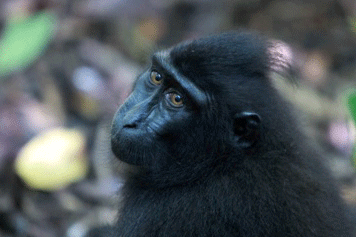The bulk of illegally traded wildlife moves through two “triangles” that span the Indonesian archipelago, an ecologist told scientists attending a meeting convened in Sanur, Bali by the Association for Tropical Biology and Conservation.
Ani Mardiastuti, a researcher at the Bogor Institute of Agriculture (IPB), said Indonesia has two major smuggling circuits—the Manado-Ambon-Sorong Triangle in eastern Indonesia and the Medan-Palembang-Pontianak Triangle in the western part of the archipelago—and several hub cities, including Jakarta, Medan, and Surabaya. While significant quantities of wildlife is consumed domestically, substantial volumes are destined for Asian markets, including China, Vietnam, Taiwan, Malaysia, and Japan.
 The crested black macaque, a critically endangered species endemic to the island of Sulawesi, is customarily consumed as a delicacy in the city of Manado, Sulawesi. |
Ani said the trade varies by region. In the Medan-Palembang-Pontianak Triangle, animal parts for traditional Chinese medicine, rare plant species, and endangered wildlife are commonly traded; in the Manado-Ambon-Sorong Triangle the trade is dominated by marine life and live animals like parrots, reptiles, insects, and small mammals for the pet market.
In remote regions trade is facilitated by the movement of containers, which arrive carrying essential foodstuffs and return with wildlife. Most wildlife is carried by ship—smuggling by air has diminished in recent years, according to Ani.
Ani said the trade—which according to ProFauna, a conservation group, is worth 9 trillion Rupiah ($990 million)—is difficult to control due to porous borders, lack of awareness among consumers and authorities, and high value of wildlife products. Ani added that the Indonesian government, with support of NGOs, has increased wildlife enforcement in recent years, seizing contraband and leveling fines on traffickers.